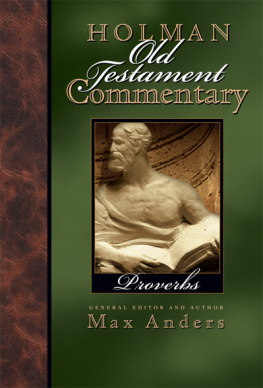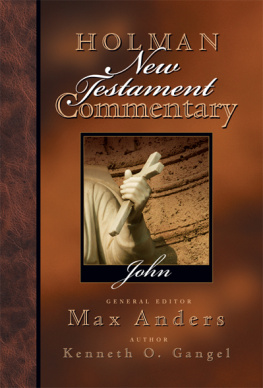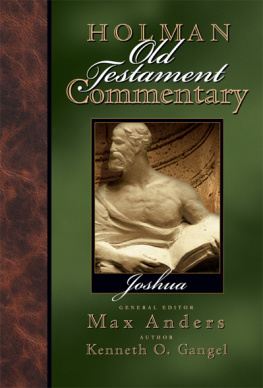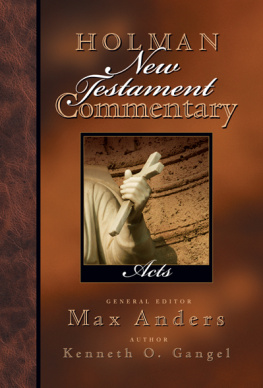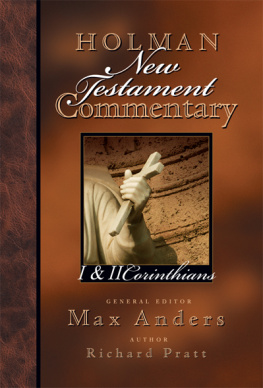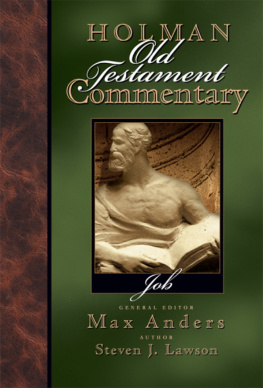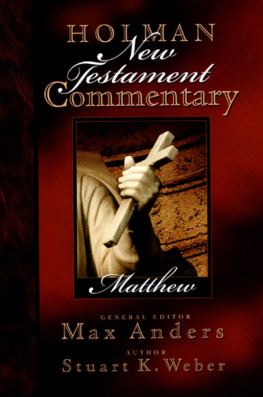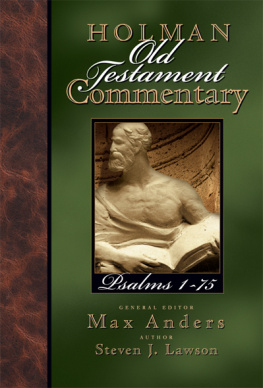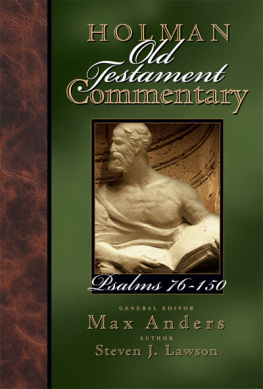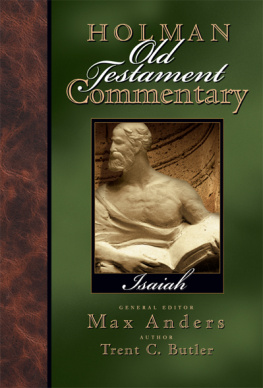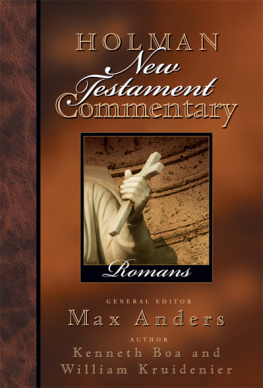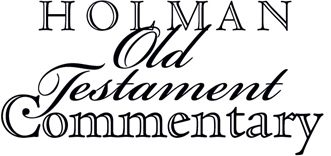
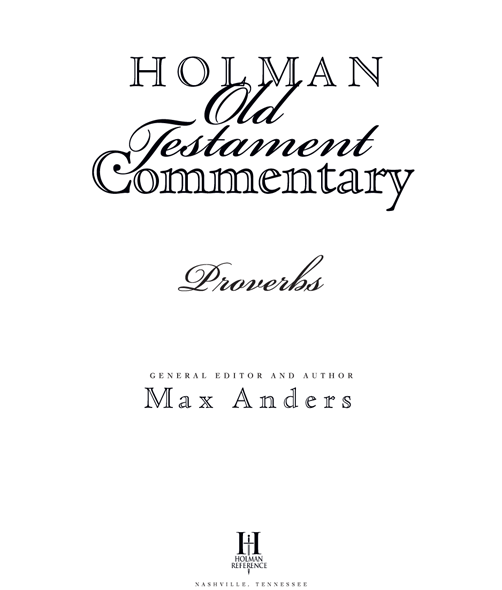
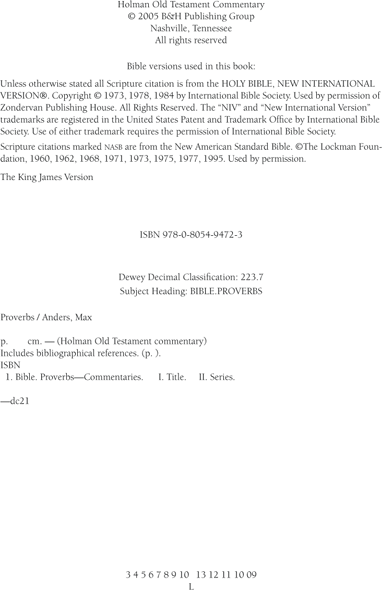
T o our children, Tanya and
Chris, who have brought life and joy
to our world, and who make me want
to be the best possible father.
Max Anders
2005
Editorial Preface
Today's church hungers for Bible teaching, and Bible teachers hunger for resources to guide them in teaching God's Word. The Holman Old Testament Commentary provides the church with the food to feed the spiritually hungry in an easily digestible format. The result: new spiritual vitality that the church can readily use.
Bible teaching should result in new interest in the Scriptures, expanded Bible knowledge, discovery of specific scriptural principles, relevant applications, and exciting living. The unique format of the Holman Old Testament Commentary includes sections to achieve these results for every Old Testament book.
Opening quotations stimulate thinking and lead to an introductory illustration and discussion that draw individuals and study groups into the Word of God. Verse-by-verse commentary interprets the passage with the aim of equipping them to understand and live God's Word in a contemporary setting. A conclusion draws together the themes identified in the passage under discussion and suggests application for it. A Life Application section provides additional illustrative material. Deeper Discoveries gives the reader a closer look at some of the words, phrases, and background material that illuminate the passage. Issues for Discussion is a tool to enhance learning within the group. Finally, a closing prayer is suggested. Bible teachers and pastors will find the teaching outline helpful as they develop lessons and sermons.
It is the editors' prayer that this new resource for local church Bible teaching will enrich the ministry of group, as well as individual, Bible study and that it will lead God's people truly to be people of the Book, living out what God calls us to be.
Acknowledgments
My thanks to
Dr. John Bechtle
for his scholarly
contribution to
this volume.
Holman Old Testament Commentary Contributors
Vol. 1 Genesis ISBN 978-0-8054-9461-7 Kenneth O. Gangel and Stephen Bramer Vol. 2 Exodus, Leviticus, Numbers ISBN 978-0-8054-9462-4 Glen Martin Vol. 3 Deuteronomy ISBN 978-0-8054-9463-1 Doug McIntosh Vol. 4 Joshua ISBN 978-0-8054-9464-8 Kenneth O. Gangel Vol. 5 Judges, Ruth ISBN 978-0-8054-9465-5 W. Gary Phillips Vol. 6 1 & 2 Samuel ISBN 978-0-8054-9466-2 Stephen Andrews Vol. 7 1 & 2 Kings ISBN 978-0-8054-9467-9 Gary Inrig Vol. 8 1 & 2 Chronicles ISBN 978-0-8054-9468-6 Winfried Corduan Vol. 9 Ezra, Nehemiah, Esther ISBN 978-0-8054-9469-3 Knute Larson and Kathy Dahlen Vol. 10 Job ISBN 978-0-8054-9470-9 Stephen J. Lawson | Vol. 11 Psalms 1-72 ISBN 978-0-8054-9471-6 Steve J. Lawson Vol. 12 Psalms 73-150 ISBN 978-0-8054-9481-5 Steve J. Lawson Vol. 13 Proverbs ISBN 978-0-8054-9472-3 Max Anders Vol. 14 Ecclesiastes, Song of Songs ISBN 978-0-8054-9482-2 David George Moore and Daniel L. Akin Vol. 15 Isaiah ISBN 978-0-8054-9473-0 Trent C. Butler Vol. 16 Jeremiah, Lamentations ISBN 978-0-8054-9474-7 Fred C. Wood and Ross McLaren Vol. 17 Ezekiel ISBN 978-0-8054-9475-4 Mark F. Rooker Vol. 18 Daniel ISBN 978-0-8054-9476-1 Kenneth O. Gangel Vol. 19 Hosea, Joel, Amos, Obadiah, Jonah, Micah ISBN 978-0-8054-9477-8 Trent C. Butler Vol. 20 Nahum, Habakkuk, Zephaniah, Haggai, Zechariah, Malachi ISBN 978-0-8054-9478-5 Stephen R. Miller |
Holman New Testament Commentary Contributors
Vol. 1 Matthew ISBN 978-0-8054-0201-8 Stuart K. Weber Vol. 2 Mark ISBN 978-0-8054-0202-5 Rodney L. Cooper Vol. 3 Luke ISBN 978-0-8054-0203-2 Trent C. Butler Vol. 4 John ISBN 978-0-8054-0204-9 Kenneth O. Gangel Vol. 5 Acts ISBN 978-0-8054-0205-6 Kenneth O. Gangel Vol. 6 Romans ISBN 978-0-8054-0206-3 Kenneth Boa and William Kruidenier | Vol. 7 1 & 2 Corinthians ISBN 978-0-8054-0207-0 Richard L. Pratt Jr. Vol. 8 Galatians, Ephesians, Philippians, Colossians ISBN 978-0-8054-0208-7 Max Anders Vol. 9 1 & 2 Thessalonians, 1 & 2 Timothy, Titus, Philemon ISBN 978-0-8054-0209-4 Knute Larson Vol. 10 Hebrews, James ISBN 978-0-8054-0211-7 Thomas D. Lea Vol. 11 1 & 2 Peter, 1, 2, 3 John, Jude ISBN 978-0-8054-0210-0 David Walls & Max Anders Vol. 12 Revelation ISBN 978-0-8054-0212-4 Kendell H. Easley |
Holman Old Testament Commentary
Twenty volumes designed for Bible study and teaching to enrich the local church and God's people.
| Series Editor | Max Anders |
| Managing Editor | Steve Bond |
| Project Editor | Dean Richardson |
| Product Development Manager | Ricky D. King |
| Marketing Manager | Stephanie Huffman |
| Executive Editor | David Shepherd |
| Page Composition | TF Designs, Greenbrier, TN |
Introduction to
Proverbs
AUTHOR AND DATE
Solomon is generally thought to have authored the entire Book of Proverbs except for three sections: the Sayings of the Wise in Proverbs 22:17-24:34, Proverbs 30, and Proverbs 31. He may have collected and compiled the Sayings of the Wise, but it is generally agreed that he did not write them. We do not know who wrote them, nor do we know anything about the authors of Proverbs 30-31. They are attributed to Agur and Lemuel, but we do not know who they are. Some scholars think that Lemuel was just another name for Solomon, but others do not. Since there is language in Proverbs 31 that some believe has Arabian influence, there is some support for Lemuel being from Arabia.
Solomon ruled Israel from 971 to 931 B.C. He seems to have written his proverbs early in his reign, before his heart was turned from the Lord (1 Kgs. 11:1-11), since the book reveals a heart given completely to God. The Sayings of the Wise appear to have been written at some undetermined time before that. The Book of Proverbs was not compiled in its final form until Hezekiah's day or after since Proverbs 25:1 says, These are more proverbs of Solomon, copied by the men of Hezekiah king of Judah. Hezekiah ruled about 715-686 B.C.
THE PURPOSE OF PROVERBS
First Kings 4:30 says that Solomon was wiser than any other man. The Book of Proverbs is a compilation of short sayings or maxims designed to present important truth in memorable form. The Hebrew word for wisdom means skill in living. The purpose of Proverbs is to give the reader skill for living life from God's perspective and, in doing so, give the wise person greater happiness. Wisdom begins with a fear of the Lord (reverence and respect, not terror) and includes knowledge, understanding, discretion, discernment, and obedience. Proverbs is to be used to help succeeding generations be successful in life, primarily by contrasting the difference between the wise person and the fool.
Next page
